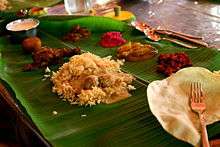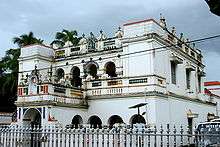Chettinad
Chettinad is a region of the Sivaganga district of southern Tamil Nadu state, India.
Demography
In the 19th and early 20th centuries, many residents of Chettinad emigrated to South and Southeast Asia, particularly Ceylon and Burma. By 2010, only 74 villages remained of the original 96. According to Guy Trebay in "Houses of the Holy" (New York Times, 17 November 2010), Chettinad now consists of a network of 73 villages and 2 towns forming clusters spread over a territory of 1,550 km2 in the Districts of Sivagangai and Pudukottai in the State of Tamil Nadu. It finds itself in the UNESCO nomination for sites of historic and cultural value.
Life in Chettinad is relaxed. Barren streets make way for random scooters or a passing animal. In the dead heat of the day you’d swear you’d landed in a ghost town. The whole area is an odd juxtaposition of crumbling buildings next to beautifully renovated mansions and dry narrow streets running in front of lush green fields of vegetation. Chettinad is indeed a captivating place. Something out there draws you in, enticing you to discover more. The people of Chettinad speak Tamil.
Community
Chettinad is the home of the Nattukottai Chettiars (Nagarathar), a prosperous banking and business community. It is also known for its local cuisine, architecture, and religious temples.[1]
Chettinad cuisine

The word "Chettinad" means a social caste specialising in the preparation of food. Consequently, the Chettinads are considered master chefs, and Chettinad cuisine is one of the spiciest and the most aromatic in India. The dishes are usually topped with a hard boiled egg. Meals also consist of cooked lentils, Brinjal curry, drumstick sambar, ghee for flavouring rice, and sweet meats like payasam and paal paniyaram. For example, Kara kolambu is a highly regarded South Indian sambar, while Aadi kummayam is a sweet delicacy, made from pulses. In general, beef and pork dishes are not served. Some well-known local dishes are Chicken Chettinad (Spicy Chicken Curry), Vegetable Chettinad (a vegetable curry) and dishes featuring seafood.
Architecture

The Chettinad region is well known for its 18th-century mansions, whose wide courtyards and spacious rooms are embellished with marble and teak. Construction materials, decorative items and furnishings were mostly imported from East Asian countries and Europe. The marble was brought from Italy, chandeliers and teak from Burma, crockery from Indonesia, crystals from Europe and wall-to-wall mirrors from Belgium.
Many of these mansions were built using a type of limestone known as karai.[2] Local legend has it that the mansion walls were polished with a paste made out of eggwhites to give them a smooth texture.
Temples
Originally built by early Tamil dynasties like the Cholas, the temples of Chettinad stand testimony to the spiritual beliefs of local people. Temples are built per Vaastu Shastras and Agamas as the Chettinad wealthy sponsored the buildings and the shilpis after the royal families declined. On the side note, traditional houses were also built per ancient text on architecture called Vaastu Shastras.
Each temple has its own tank called oorani where water lilies are grown and used for holy rituals. Even today, much of Chettinad's daily activities are centered around the festivities of the temple. Among the many famous temples are: Vairavan Kovil, Iraniyur, Karpaga Vinayakar, Kundrakudi Murugan, Kottaiyur Sivan, and Kandanur Sivan temples, with each having its own unique deity.[3]
Vinayagar Chathurthi is celebrated every year, on the day when the two stars Shasti and Sadhayam mingle together. Pillaiyar Nonmbu, its name, is usually in the month of December. On this day, they sing songs of the deity Lord Vinayagar and then take a sweet called Ellai.[4]
Local Crafts
The Chettinad Sari
The cotton sari also known as "kandaangi", is unique in the dramatic and spontaneous use of colour and pattern with bold checks, stripes and contrasting hues.[5] Its vibrance and weight are its distinguishing factors. Records and old photographs show the use of sari by previous generations, before the advent of blouses and underskirts, which is worn rather differently from the regular sari. At present, it is available in Karaikudi.
Aathangudi tiles
Athangudi tiles, named after the place of the manufacture in Chettinad, Tamil Nadu, come in a myriad of colours and patterns, and are made by a unique process using local soil and glass plates.[6] These tiles are a testament to the rich cultural heritage of the Chettiar community, who effectively adapted many influences to their own brand of local craftsmanship. The designs and colours used in Athangudi tiles are still those of a bygone era. However, of late, new designs and patterns are being incorporated.
The Athangudi tiles are hand-made. However, with a short shelf life and relatively slow manufacturing process, these tiles are not much in demand. The situation has led to the decline in the market.
Industry
Chettinad's principal town, Karaikudi is also the location of a branch of the Central Electro Chemical Research Institute (CECRI), one of the forty national laboratories under the aegis of the Council of Scientific and Industrial Research (CSIR) in New Delhi. The CSIR lab specializes in electro-chemical research and has been operational for more than fifty years. The campus is on over 300 scenic acres, filled with traditional and ornamental vegetation.[7] It has been awarded more than 750 patents and published more than 5,000 research articles in the areas of Electrochemical Science and Technology such as battery, metal finishing, materials science, organic and inorganic electro-chemicals, corrosion prevention and paints. CECRI conducts four-year Engineering and Technology course in chemical and electro-chemical engineering and technology affiliated with the Anna University in Chennai.
Travel
The nearest airports are Madurai Airport and Tiruchirappalli International Airport while the largest towns in the area are Karaikudi and Devakottai. Trains that run from Chennai to Rameshwaram stop at Pudukkottai, Karaikudi, Kanadukaathan (Chettinad Station), Devakottai and Kallal. There are also frequent town buses from Karaikudi to Chettinad.
Notable people
- Dr. Alagappa Chettiar - founder of the various educational institutions in Karaikudi and its surroundings. Alagappa University, Alagappa Chettiar College of Engineering and Technology, and Alagappa Government Arts College are a few institutes named in his honour.
- Raja Sir Annamalai Chettiar - founder of Indian Bank and the Annamalai University bears his name.
- P. Chidambaram - former Finance Minister of India.
- Kaviarasar Kannadasan - Tamil poet.
- Dr. Justice A. R. Lakshmanan (b. 1942) - former judge of the Supreme Court of India and current chairman of the Law Commission of India.
- A. V. Meiyappan - founder of AVM Productions, the oldest and largest film production studio in Kollywood, the Tamil language film industry of India.
References
- ↑ "Chettinad". Pbase.com. Retrieved 22 March 2012.
- ↑ "About Karaikudi". cecri.res.in. Retrieved 22 September 2013.
- ↑ "Temple history". pillaiyarpattitemple.com. Retrieved 26 September 2013.
- ↑ "Temple history". pillaiyarpattitemple.com. Retrieved 26 September 2013.
- ↑ "A Legacy called Chettinad Saris". www.thehindu.com. Retrieved 2 October 2013.
- ↑ "Legacy of Athangudi tiles". www.thehindu.com. Retrieved 26 September 2013.
- ↑ "Campus Ambiance". cecri.res.in. Retrieved 2 October 2013.
External links
| Wikimedia Commons has media related to Chettinad. |
- CECRI Homepage
- Chettinad Palace in Kanadikathan photo impressions
- Roja Muthiah Chettiar – RMRL – Article from Frontline Dec 2005
- Roja Muthiah Chettiar – Article from the University of Chicago Library Magazine
- Roja Muthiah chettiar – Article from Frontline – Sep 2000
- How to wear Chettinad Sari